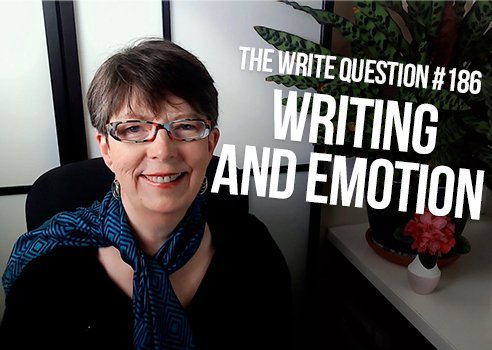Viewing time: 4 mins 48 secs
The Write Question is a weekly video podcast all about writing. Today’s question? Should writing generate emotion? If you have a question you’d like me to answer you can email me, tweet me @pubcoach, or leave a message for me at the Skype account, The Write Question.
Transcript:
Should writing generate emotion? That’s the topic I’m addressing today in The Write Question. I’m Daphne Gray-Grant, the Publication Coach, still in pandemic mode.
I have a question from Christo Marais, a writer based in Johannesburg, South Africa. Here’s what he’s asked by email…
“Can one believe that writing must evoke emotion, just as good music does?”
Thanks for your fascinating question, Christo. First off, I’m going to assume you mean emotion in the reader rather than the writer.
And, generally, speaking, I agree. But I think I’d quibble with your word “must.” It strikes me there are certain types of writing where emotion just isn’t required and might even be considered inappropriate. Think, for example, of the following cases:
- A hardware catalogue
- A press release about corporate earnings
- A blog post about how to update your will
- An article about how to use the software Excel
None of these types of writing would require emotion and I don’t believe any of them would benefit from it either.
But for other types of writing, such as most fiction, journal entries, some newspaper stories and certain types of blog posts, evoking emotion on the part of your readers would be a really smart thing to do.
The next question is HOW to do it. Here are five tips:
1 – Identify the emotion you want your readers to feel. Do you want them to be happy? Scared? Angry? Frustrated? Target the emotion you’re going for so that you’ve created a writing goal for yourself.
2 – Feel it for them. If you don’t feel the emotion yourself, it’s going to be awfully tough for you to write about it. Do whatever you need — perhaps recalling memories from your own life — to evoke those feelings in yourself before you start trying to write about them.
3 – Use tension. Readers love being surprised. The feeling of ‘not knowing’ what’s going to happen can help draw them through dozens of pages of text. For this reason, try to build elements of tension and suspense into your writing as you work to convey the emotion you’ve targeted.
4 – Be as specific as possible. Many writers worry that they’ll bore their readers by being too particular, but they are wrong. Being specific — talking about Madison Jones’ fight with COVID — is way more interesting than talking generically about COVID. Always go for the specific.
5 – Show rather than tell. Most emotions are complicated. Telling lets you convey only the most basic part of the story, while showing allows you to get into all sorts of colourful detail.
Let me read an example of telling: Brent felt frustrated because he’d been fired from his job.
Now, let me read an example of showing: Brent looked in the window of the office where he had worked until yesterday. Inside, he could see computers surrounded by stacks of books, piles of paper and abandoned coffee cups. Seeing the detritus of his former life made him recall the pleasant buzz of excitement he always felt when facing a deadline. Now, nothing — no one — depended on what he did or the decisions he made. The sun glinted on the glass and captured his own reflection — his furrowed brow and his questioning eyes — as he tried to figure out why his boss had hated him so much.
Do you see the vast difference between the two approaches, Christo?
And here’s a bonus tip for anyone who’s ever had difficulty exploring their own emotions. Mindmapping can really help you! In the show-notes below, I provide a link to all the videos and posts about mindmapping available on my website.
Finally, let me wrap up with a quote from the Grammy Award-winning American singer and songwriter Judy Collins: “I don’t think you get to good writing unless you expose yourself and your feelings. Deep songs don’t come from the surface; they come from deep down.”
Christo, being able to express emotion is a tremendous skill for certain kinds of writing. Good for you for being aware of this.
*
If you’d like to learn more about how to make writing a happier and more rewarding process, check out my latest book Your Happy First Draft. I don’t sell it in bookstores or via Amazon. The only place to buy it is on my website, link on the screen below and in the show notes.


